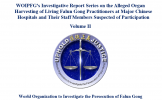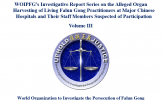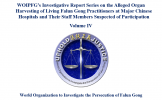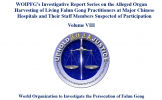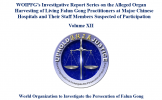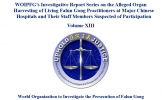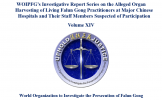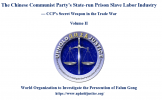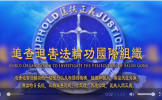The Chinese Communist Party’s State-run Prison Slave Labor Industry — CCP’s Secret Weapon in the Trade War (Volume II)
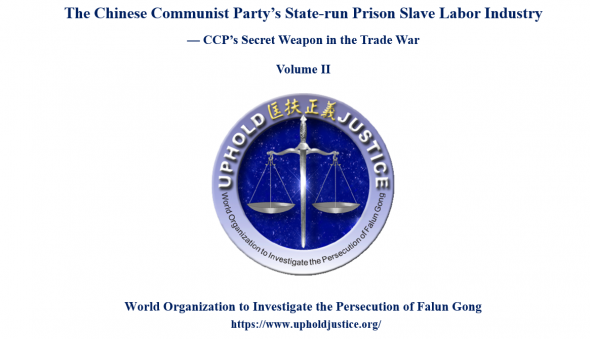
(Download: Volume II.pdf )
The Chinese Communist Party’s State-run Prison Slave Labor Industry — CCP’s Secret Weapon in the Trade War
By investigating the Chinese Communist Party’s (CCP) prisons and now-abolished labor camps forcing Falun Dafa (i.e. Falun Gong) practitioners to produce slave labor products, World Organization to Investigate the Persecution of Falun Gong (WOIPFG) uncovers the CCP’s serious violation of human rights of enslaved individuals. It also brings to light the economic aggression against the international community and its destruction of human moral conscience. The slave labor victims are mainly Falun Gong practitioners, as well as human rights advocates such as lawyers with a sense of justice.
The large-scale production and circulation of these ultra-low-cost and extremely competitive slave labor products have made a great impact on the international labor market and economic market. The result is bankruptcies of a large number of businesses in the same industries. At the same time, the large number of people who lost their jobs as a result of this unfair competition, have become a serious burden to the international society and foreign governments, disrupting the normal order of the market economy.
More severely, the existing slave labor enterprises in China are wholly state-owned. they are established by using the human and material resources of all Chinese prisons. They have been transformed from the previous prison enterprise system into a state slave labor industry with a unified and militarized management by the Chinese Communist Party, directly led and guided by its judiciary system, and with the financial support from the state. According to the incomplete data obtained from our investigation, there are at least 681 state-owned prison enterprises in 30 provinces, municipalities directly under the central government’s control and autonomous regions in China. Since these enterprises have a centralized and unified management, their manpower resources are slave labor with almost no cost; they challenge the individual’s physiological and psychological limits and use torture to coerce the detainees to perform slave labor; there is the massive scale of human resources in prisons, now-abolished labor camps and brainwashing centers; and there are the CCP’s economic information resources, and the support from the state economic and trade diplomacy and preferential policies, a super-strong economic and trade entity beyond any restriction has come into being. It serves as an enormously powerful strategic weapon for the CCP’s international trade and economic aggression. As a result, in the entire world, no company can compete with the CCP’s slave labor enterprises. Regardless how many tariffs the United States imposes on China, the CCP’s slave labor industry will not be significantly affected.
The scale and production capacity of these enterprises and their subsidiaries are astonishing. For example, Sichuan Heqiang Group Co., Ltd.[1], affiliated to the Sichuan Provincial Prison Administration Bureau, has at least 43 subsidiaries. The general manager of the company, Zeng Yongzhong, is also the deputy director and communist party committee member of the Sichuan Provincial Prison Administration Bureau.[2] Sichuan Heqiang Group Co., Ltd. was established as a parent company in November 2011, and subsequently, the 43 prisons across the province all set up its subsidiary companies. As of December 31, 2017, the total assets of these prison enterprises in Sichuan Province reached 3.485 billion yuan.
Among them, Sichuan Xinlei Industry Co., Ltd.[3], one of its subsidiary companies, is affiliated to Sichuan Leimaping Prison, has more than 1,100 police guards and soldiers of the People’s Liberation Army, and is capable of detaining 100,000 inmates. Located in the deep mountains at the border of Sichuan Province and Yunnan Province and surrounded by 133 square kilometers of rolling hills, the prison has 230 detention sites on different hill tops and the highest hilltop site confines more than 23,000 inmates. Its business operations include electronic equipment manufacturing; hydropower generation; housing services; textile and garment processing; manufacturing of construction materials, plastic products, daily commodities and household goods; retail of prepackaged foods and dairy products; and retail of cigarettes and cigars.
The CCP refers to this slave labor system in its prisons, now-defunct labor camps and detention centers as “reform through labor”. Due to the lure of huge profits from slave labor products, the slave labor industry has been becoming more and more developed. Especially since the CCP began suppressing Falun Gong practitioners in 1999, the scale of the CCP’s slave labor production has expanded rapidly. With the CCP’s “reform and open-up policy” and its accession to the WTO, in order to highlight the prison economy’s “competitive advantages” in the trend towards economic globalization, in 2003, the Chinese Communist Party separated its prison enterprises from their affiliated prisons and set up new wholly state-owned prison enterprises, their subsidiaries and branch companies. The legal representatives of these prison enterprises at all levels are Communist Party officials, thus forming the CCP’s state slave labor industry that is planned, coordinated and managed in a highly militarized and unified manner, from the CCP Central Committee to its grass-roots levels.[4]
The information collected by WOIPFG indicates that severe abuse of slave labor exists in the prisons and existed in the now-abolished labor camps of the Chinese communist regime. All detained Falun Gong practitioners have suffered from severe slave labor. The enslaved victims also include human rights activists and righteous lawyers, who have the courage to speak for vulnerable groups and fight for justice. The victims are aged between 16 and 70. Within barbed wires and prison walls, many of them are forced to work painstakingly between 12 and 19 hours a day. When the "production tasks" were heavy, they would have to "work overtime" for even more hours; sometimes they cannot sleep for several days in a row. The enslaved individuals endure unspeakable and unimaginable physical and mental sufferings, adverse living conditions, punishments and even torture, which challenge their physiological and psychological limits. Many of them have contracted various diseases or become incapacitated due to persecution; some have even perished under persecution. [5]
Falun Gong is also known as Falun Dafa. It is based on the principle of “Truthfulness, Compassion and Tolerance”. By government estimation, in 1998 there were 70 to 100 million Falun Gong practitioners in Mainland China. The Chinese Communist Party started persecutions against Falun Gong practitioners in July 1999. As estimated in a US State Department report of 2013, there were 1640,000 prisoners detained in 681 prisons in China. As discovered by a non-profit organization the Forced Labor Research Foundation, there are about 1400 forced labor facilities in China. It is estimated that there are more than 3 million detainees[6]. According to United States “2008 Religious Freedom Report”, more than half of the detained in Chinese forced labor camps are Falun Gong practitioners[7]. Based on the above arguments, it is estimated that there are more than 1 million Falun Gong practitioners detained in forced labor camps (the reeducation through labor system).
On June 18, 1998, at its closing ceremony of the 86th session in Geneva, the International Labor Organization formally passed the ILO Declaration on Fundamental Principles and Rights at Work, which points out clearly the need to eliminate “all forms of forced or compulsory labor”. As a participating member of the International Labor Organization, instead of carrying out the Organization’s provisions, China has adopted many preferential policies for the businesses within its labor camp and prison systems, while stimulating and encouraging the growth of such enterprises and attracting foreign investments for them. Protected by such preferential policies, businesses located in the economic development zones of some provinces and cities even try to attract foreign investments by directly advertising the cheaper labor from the imprisoned individuals, which has resulted in an alarming expansion of slave labor enterprises. For example, Hangzhou Z-shine industrial Co., Ltd. now has 38 prisons as its production units, with more than 40,000 prisoners manufacturing fabrics and clothes for exports, and 90 percent of their products are sold overseas.
This investigative report represents only the tip of the iceberg of the slave labor reality under the Chinese communist regime. The problems it identifies, however, have an impact on the whole society, which is of deep concern. What is happening in the communist China is not only a violation of the enslaved laborers’ human rights, but also a devastating destruction of human moral conscience.
In reality, the slave labor industry under the Chinese communist regime survives and grows with the international community’s collaboration. WOIPFG published two reports on November 7, 2003[8] and April 5, 2004[9] respectively, revealing the hidden slave labor production under the Chinese communist regime and its impact on international markets. In addition, WOIPFG submitted a report more than 10 years ago to the US government, requesting a ban on the import of certain products made by slave labor, however, our efforts were hampered. A great number of jobs in many countries, including some in the United States, have been lost to the slave labor industry in China, thus financially aiding the Chinese communist regime’s persecution of human rights. In other words, to keep a close watch on human rights issues in China, the international community not only has a moral obligation, but also directly affects its own economic interests and social security.
World Organization to Investigate the Persecution of Falun Gong
Tel: 1-347-448-5790
Fax: 1-347-402-1444;
P.O. Box 84, New York, NY 10116
https://www.upholdjustice.org,https://www.zhuichaguoji.org
Reference:
[1] Sichuan Provincial People’s Congress website: “Report about the establishment of Sichuan Heqiang Group Co., Ltd. by Sichuan Provincial Prison Administration Bureau”. https://web.archive.org/web/20180420205251/http://www.scspc.gov.cn/dygz/201803/t20180315_34150.html
[2] Baidu Baike. “Zeng Yongzhong (General Manager of Sichuan Heqiang Group Co., Ltd.)” https://archive.is/FtZjy
[3] “Leimaping Prison of Sichuan.” archive.today,https://archive.is/KRomn
[4] Zaidian.com. “Notice of the State Council’s Instructional Advice to the Ministry of Justice regarding Experimental Work on Structural Reform of the Prison System”. December 10, 2016.
http://www.zaidian.com/jiaoshiwenzhang/657047.html
[5] Investigative Report on Slave Labor in Chinese Labor Camps Holding Falun Gong Practitioners (Part I)
http://www.upholdjustice.org/node/94
[6]U.S.-China Economic and Security Review Commission Staff Research Report July 9, 2014 Prison Labor Exports from China and Implications for U.S. Policy Author: John Dotson Senior Policy Analyst, Political Affairs and Teresa Vanfleet Research Fellow, Security and Foreign Affairs https://www.uscc.gov/sites/default/files/Research/Staff%20Report_Prison…
[7] US Department of Statehttp://www.state.gov/: International Religious Freedom Report 2006 (Bureau of Democracy, Human Rights, and Labor): China (includes Hong Kong, Macau, and Tibet): Abuses of Religious Freedom “Some foreign observers estimated that at least half of the 250,000 officially recorded inmates in the country's reeducation-through-labor camps were Falun Gong adherents. Falun Gong sources overseas placed the number even higher.”
http://www.zhuichaguoji.org/node/64344#_Toc444526267
[8] WOIPFG. “Investigative Report on Slave Labor in Chinese Labor Camps Holding Falun Gong Practitioners (Part I).” October 16, 2003. http://www.upholdjustice.org/node/94
[9] WOIPFG. “Investigative Report on Slave Labor in Chinese Labor Camps Holding Falun Gong Practitioners (Part II).” April 5, 2004. http://www.upholdjustice.org/node/95





